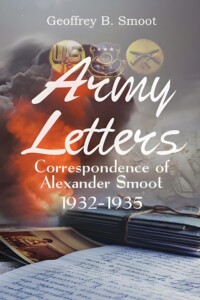Title: Army Letters: Correspondence of Alexander Smoot 1932-1935
Author: Geoffrey Smoot
Publisher: Bookstand Publishing
ISBN: 978-1634982689
Pages: 318
Genre: History / Military
Reviewed by: Jack Chambers
Pacific Book Review
The lens in which we tend to view history and the wars which have defined our world come from a much grander, more global point of view. For the most part, the use of history, politics, and global powers in looking at the impact of war on our world is a common practice, but rarely do we get the opportunity to really take in the personal stories of those individuals who lived through the horrors of war.
There are so many people who lived through, fought in, or experienced WWII. Out of the great depression and into the growing war effort of the global powers, there are thousands of people who enlisted or were drafted into the war, and would become integral parts of the war effort.
In author Geoffrey Smoot’s Army Letters: Correspondence of Alexander Smoot 1932-1935, the author delves into the life of one of their relatives, who lived through this era of history. Using personal letters written by Alexander Smoot, the author showcases the personal connection to family Alexander had, and the impact of the war as it grew and grew over time.
Immediately I was struck by just how personal this book was to both the author and those who knew or experienced for themselves the journey through that horrific war. The use of personal letters from the subject of this book, Alexander Smoot, made this a truly compelling read. The letters give the reader not only insight into the mindset and actions of this young man during this time, but highlight the struggles and hardships facing him as he not only trained but prepared for the war effort to come. The powerful imagery in the author’s writing style and the tension that built as the letters grew more and more concentrated in their subject matter made this a thrilling book to get lost in.
The use of history, and military history in particular, made this a fantastic book for non-fiction readers. The personal family connection that not only the author shared with the subject of this book, but the family connection in Alexander’s articles and letters made this feel more personable and heartfelt in its delivery. The emotional and physical stakes the subject found themselves in, as well as the detail that went into the letters to capture the weight of the subject matter at hand, kept me invested in this book, and allowed the balance of personal storytelling with historical engagement to be quite a brilliant and heartfelt read.


